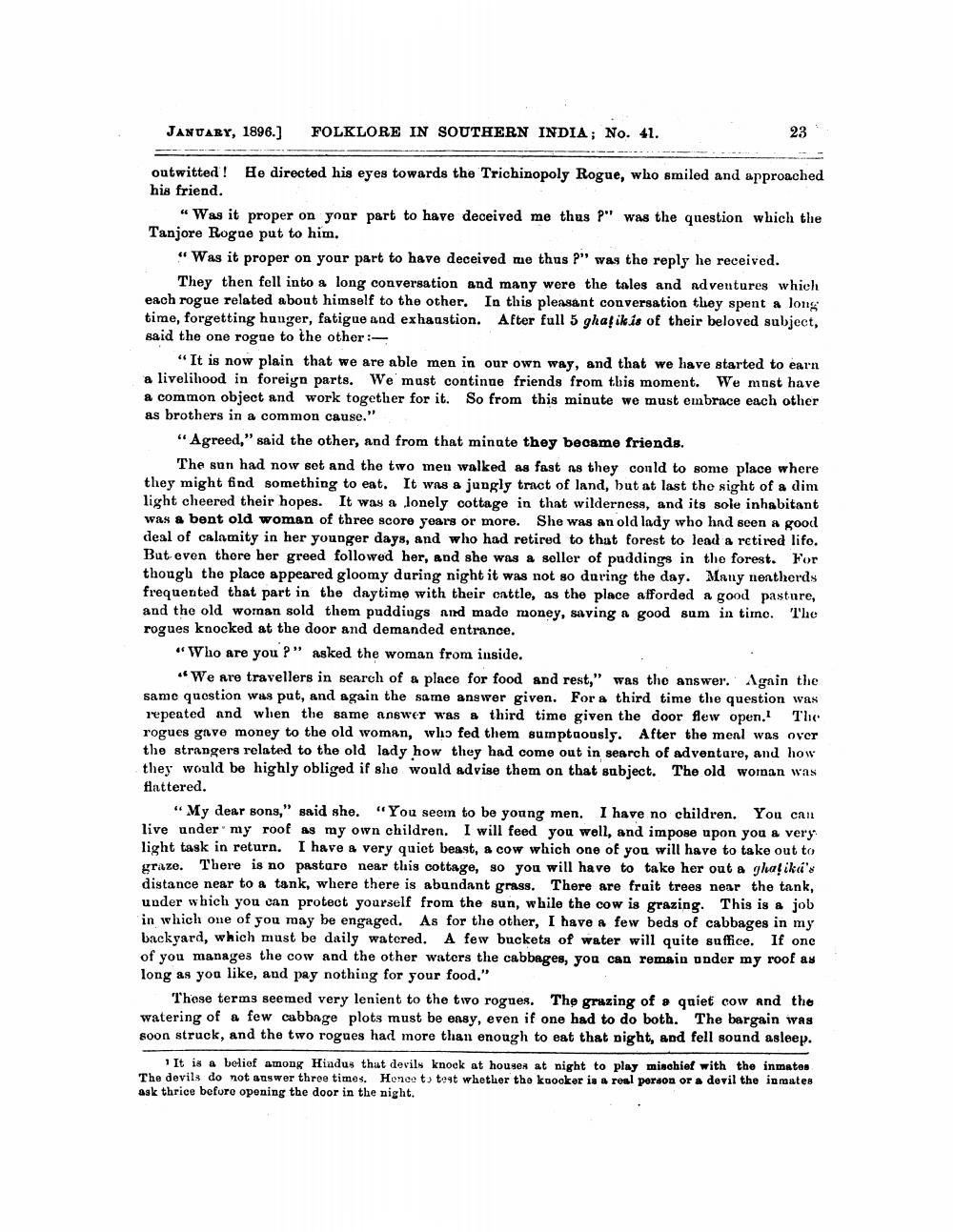________________
JANUARY, 1896.]
FOLKLORE IN SOUTHERN INDIA; No. 41.
23
outwitted! He directed his eyes towards the Trichinopoly Rogue, who smiled and approached his friend.
"Was it proper on your part to have deceived me thus ?" was the question which the Tanjore Rogue put to him.
"Was it proper on your part to have deceived me thus ?" was the reply he received.
They then fell into a long conversation and many were the tales and adventures which each rogue related about himself to the other. In this pleasant conversation they spent a long time, forgetting hunger, fatigue and exhaustion. After full 5 ghafik is of their beloved subject, said the one rogue to the other:
"It is now plain that we are able men in our own way, and that we have started to earn a livelihood in foreign parts. We must continue friends from this moment. We must have a common object and work together for it. So from this minute we must embrace each other as brothers in a common cause."
"Agreed," said the other, and from that minute they became friends.
The sun had now set and the two men walked as fast as they could to some place where they might find something to eat. It was a jungly tract of land, but at last the sight of a dim light cheered their hopes. It was a lonely cottage in that wilderness, and its sole inhabitant was a bent old woman of three score years or more. She was an old lady who had seen a good deal of calamity in her younger days, and who had retired to that forest to lead a retired life. But even there her greed followed her, and she was a seller of puddings in the forest. For though the place appeared gloomy during night it was not so during the day. Many neatherds frequented that part in the daytime with their cattle, as the place afforded a good pasture, and the old woman sold them puddings and made money, saving a good sum in time. The rogues knocked at the door and demanded entrance.
"Who are you?" asked the woman from inside.
"We are travellers in search of a place for food and rest," was the answer. Again the same question was put, and again the same answer given. For a third time the question was repeated and when the same answer was a third time given the door flew open. The rogues gave money to the old woman, who fed them sumptuously. After the meal was over the strangers related to the old lady how they had come out in search of adventure, and how they would be highly obliged if she would advise them on that subject. The old woman was flattered.
"My dear sons," said she. "You seem to be young men. I have no children. You can live under my roof as my own children. I will feed you well, and impose upon you a very light task in return. I have a very quiet beast, a cow which one of you will have to take out to graze. There is no pasture near this cottage, so you will have to take her out a ghatika's distance near to a tank, where there is abundant grass. There are fruit trees near the tank, under which you can protect yourself from the sun, while the cow is grazing. This is a job in which one of you may be engaged. As for the other, I have a few beds of cabbages in my backyard, which must be daily watered. A few buckets of water will quite suffice. If one of you manages the cow and the other waters the cabbages, you can remain under my roof as long as you like, and pay nothing for your food."
These terms seemed very lenient to the two rogues. The grazing of a quiet cow and the watering of a few cabbage plots must be easy, even if one had to do both. The bargain was soon struck, and the two rogues had more than enough to eat that night, and fell sound asleep.
It is a belief among Hindus that devils knock at houses at night to play mischief with the inmates. The devils do not answer three times. Hence to test whether the knocker is a real person or a devil the inmates ask thrice before opening the door in the night.




